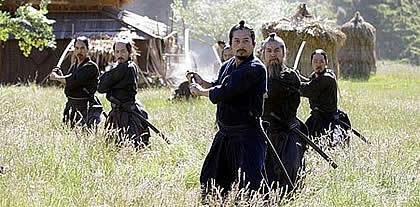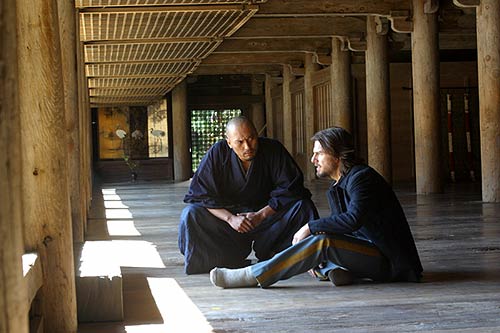 I recently watched “The Last Samurai”, and it was the first film that came to mind when we were presented with the discussion topic of Religion and Film in class. I wanted to examine a film that did not focus on mainstream Christianity and see what could be learned from a more foreign angle. I also wanted to look past the romantic ideals of Hollywood action, romance, film style and actors present in the film to the themes at work and the perspective they offer.
I recently watched “The Last Samurai”, and it was the first film that came to mind when we were presented with the discussion topic of Religion and Film in class. I wanted to examine a film that did not focus on mainstream Christianity and see what could be learned from a more foreign angle. I also wanted to look past the romantic ideals of Hollywood action, romance, film style and actors present in the film to the themes at work and the perspective they offer.The film highlights conflict surrounding Japan’s effort to socially and politically transform into a modern country (and ultimately world-power) during the mid-to-late 19th century. The story follows cavalry captain Nathan Algren, who suffers dark, internal emotional struggles caused by his time in warfare. Algren travels to Japan and learns the samurai way of life in the process of fighting to protect them. While not designed to be a religious film, so much of the samurai lifestyle depicted in the narrative illustrates Buddhist and Shinto principles (particularly Zen) practiced and embraced by many in Asia and around the world to this day.

In the film the samurai are completely committed to the warrior code that is their way of life. At the core of this code – what gives the samurai meaning and purpose in their actions – is intense conviction in the spiritual power of Buddhism. During his time among the samurai, Algren makes these observations of how their values influence their daily lives:
“They are an intriguing people. From the moment they wake, they devote themselves to the perfection of whatever they pursue. I have never seen such discipline.”
“There is so much here I will never understand. I’ve never been a church-going man, and what I’ve seen on the field of battle has led me to question God’s purpose. But there is indeed something spiritual in this place. And though it may forever be obscure to me, I cannot but be aware of its power.”
“What does it mean to be samurai? To devote yourself utterly to a set of moral principles. To seek a stillness of your mind.”
Another example of the effect this commitment can have on one’s life is the samurai leader Katsumoto, the film’s model of this deep and passionate devotion. On more than one occasion he reveals the obligation he feels to his ancestors to live a life of service, discipline and compassion. He also explains throughout the film the samurai view of death, and the ideology behind how it is achieved honorably or not.
“They are an intriguing people. From the moment they wake, they devote themselves to the perfection of whatever they pursue. I have never seen such discipline.”
“There is so much here I will never understand. I’ve never been a church-going man, and what I’ve seen on the field of battle has led me to question God’s purpose. But there is indeed something spiritual in this place. And though it may forever be obscure to me, I cannot but be aware of its power.”
“What does it mean to be samurai? To devote yourself utterly to a set of moral principles. To seek a stillness of your mind.”
Another example of the effect this commitment can have on one’s life is the samurai leader Katsumoto, the film’s model of this deep and passionate devotion. On more than one occasion he reveals the obligation he feels to his ancestors to live a life of service, discipline and compassion. He also explains throughout the film the samurai view of death, and the ideology behind how it is achieved honorably or not.

I find the cultural practice and application of Eastern religious beliefs in daily lifestyles fascinating, especially in comparison to Western religion (specifically Christianity). At the risk of stereotyping, it often seems as though many Westerners tend to view religion as a distinct aspect of their life, separate from other activities. Personal conviction can also at times seem to carry more weight in an organized group setting. It’s as if religion can be a switch to be turned on or off depending on the circumstance, mood, difficulties or day, and more easily done so when not among other group members.
In contrast, the Eastern stereotype of religious practice can come across as quiet and subtle, and yet tremendously influential, consistent and all-encompassing in its effect on an individual’s daily life. It seems that it can very much be a self-defining path, and that this experience is independent of the group’s practices or direction, such that the personal conviction can’t help but visibly manifest itself in that person’s way of life.
The pursuit of perfection and the power found in complete devotion to a set of moral values are principles that we can relate to as Latter-day Saints. Having said that, I don’t believe we have a monopoly on such beliefs. I think there is much we can learn from the quietly powerful example of our spiritual Eastern counterparts.
Again, looking past the style-over-substance approach of Hollywood, this leads to my question of what it is exactly we can learn and apply from the Eastern religious mindset – both in general, and from this particular example of the samurai? Some other questions to consider might be: Are followers of Christianity at times too preoccupied with religiosity over spirituality, and why? Are we more willing to learn from Eastern religious ideals because they appear non-threatening? How can the Buddhist example of focus on personal spirituality affect our own daily lifestyles?
In contrast, the Eastern stereotype of religious practice can come across as quiet and subtle, and yet tremendously influential, consistent and all-encompassing in its effect on an individual’s daily life. It seems that it can very much be a self-defining path, and that this experience is independent of the group’s practices or direction, such that the personal conviction can’t help but visibly manifest itself in that person’s way of life.
The pursuit of perfection and the power found in complete devotion to a set of moral values are principles that we can relate to as Latter-day Saints. Having said that, I don’t believe we have a monopoly on such beliefs. I think there is much we can learn from the quietly powerful example of our spiritual Eastern counterparts.
Again, looking past the style-over-substance approach of Hollywood, this leads to my question of what it is exactly we can learn and apply from the Eastern religious mindset – both in general, and from this particular example of the samurai? Some other questions to consider might be: Are followers of Christianity at times too preoccupied with religiosity over spirituality, and why? Are we more willing to learn from Eastern religious ideals because they appear non-threatening? How can the Buddhist example of focus on personal spirituality affect our own daily lifestyles?
For further religious and historical analysis of the film and its themes, take a look at this review:

Jordan Christiansen:
ReplyDeleteLike the author of this blog, I am also interested in Buddhism and the more Eastern way of religion and thought. I served a mission in South Korea where the religion of Buddishm is widespread and the principles of Buddhism are omnipresent in all aspects of Korean life.
What can we learn from the Buddhist mindset? I learned much more about inner peace and and perspective. Many of the practicing Buddhists I came in contact with were very calm, deliberate, and overall happy. The principles of self-control and finding that inner strength gave these people, even in one of the world's largest and busiest cities like Seoul, a stillness that helped them cope with life and avoid entangling emotional trials that were unneeded.
So many people in the world today, particularly in the Western world, are concerned about themselves and the moment they are in at that very second. As atheism and misinformed views of God's attributes grow more prevalent, Western ways of thought are becoming more insufficient in helping people cope with life. Though Buddhism is not the ultimate truth, its main aspects can be a blessing to those looking for peace and happiness.
There are a great many things one can take from the example of the samurai. I did martial arts for many years and one of the key principles I took from the experience was learning to do things with exactness, discipline and perfection. From a religious standpoint, I think we can all benefit from the notion that we must always be striving to be better and to maintain a strict standard for our own performance. This religion accompanies their quest for perfection with time to meditate and to ponder- thus allowing them time to consider how to improve and to rest the mind, which keeps their quest for perfection from stressing them out. So many moms in the LDS church feel like they have to be super mom and in striving for perfection, don't leave themselves this time to reflect and rest. Thus the quest of perfection becomes a burden and trial, instead of an edifying journey.
ReplyDeleteIn terms of Christians being too preoccupied with religiosity over spirituality, I think it is hard for us to sometimes separate the two. For many, the ability to live a religion to its fullest is the only measuring stick of spirituality available. Living the tenets of a religion make them feel safe that their spirituality is assured if they can but continue faithful in the practices of their faith. Religion offers tradition, authority, and companionship to those seeking God, whereas seeking your own path to Him seems like an unbeaten path that could lead to a falling away from truth.
The idea of personal spirituality is an intriguing one. It reminds us that we cannot be Sunday Mormons, that what is required is us, heart, mind, and soul totally invested in the gospel. I think as we turn away from the notion that it is the teacher’s job to make me feel the gospel is true, and the bishop’s job to make sure I don’t go astray, etc. and instead think that it is our job to prepare to be taught and our responsibility to make sure we are learning and doing our part, then we will be truer followers of the religion we adhere to.
This is so interesting to me. I have not seen the movie, but now I am definitely more inclined to. I've grown up a member of the church, so I feel like that is all I know. However, I have always believed that some religion is better than no religion. We were raised being taught that our church is the only true church, which is true, but as a child I learned it the wrong way. Since our church being the only true church was engrained in my mind as a child, I took it as our church is the only church with any truth at all. But I believe that each religion has some truth in it, just not the whole truth that we have. I am glad that films like The Last Samarai are out so we can be educated about other religions and see the good influence that they have on the people. I love the basic truths and beliefs of Buddhism that we can find inner peace by self-discipline.
ReplyDelete